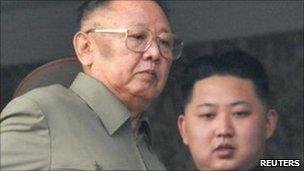North Korea's Kim Jong-il 'opposed succession'
- Published

North Korea's ailing leader Kim Jong-il appears to be preparing his youngest son as his successor
North Korean leader Kim Jong-il never wanted a dynastic succession but had no other option to stabilise the troubled regime, his eldest son has said.
Kim Jong-nam, who has lived abroad for years, made his comments in a rare interview with a Japanese newspaper.
Kim Jong-il is apparently preparing his youngest son as his successor.
Succession fears have fuelled tensions on the Korean peninsula. The current stand-off follows the North's shelling of a South Korean island in November.
On Friday, North Korea called for parliamentary talks on how "to settle the grave situation prevailing between the North and the South."
This request was rejected by Seoul as it "lacked sincerity", the unification ministry said.
However, the two Koreas have agreed to bilateral military talks on the fatal attack on Yeongpeong island and the sinking in March of a South Korean warship, widely blamed on a North Korean torpedo attack - although the North strongly denies any role.
Seoul has also proposed separate talks on Pyongyang's renewed pledges on its nuclear disarmament.
'Great works'
Kim Jong-il's eldest son was interviewed in mid-January by the Tokyo Shimbun.
Hereditary succession "does not fit with socialism, and my father was against it as well," he was quoted as saying in the article, which was published on Friday.
"My understanding is that (succession) was to stabilise the internal system. An unstable North Korea leads to instability in the region."
He said he wanted his youngest half-brother to "take over the great works my father has done. I want him to enrich people's lives," he said.
He said: "North Korea should pay attention to reform and openness. If it continues like this, it cannot become an economic power.
He added that what the North desired most was the "normalisation of ties with the US" and peace on the peninsula.
Kim Jong-nam, who is mainly based in Macau, is believed to have missed out on being chosen as the next leader because of his flamboyant lifestyle. He was also caught trying to enter Japan in 2001 on a false passport.
The ailing North Korean leader - who took over the country from his father after his death in 1994 - is seen as setting up the transfer of power to his youngest son Kim Jong-un.
Last year, the 27-year-old was made a four-star general and given senior posts in the ruling Workers' Party. Since then, he has been frequently pictured alongside his father.